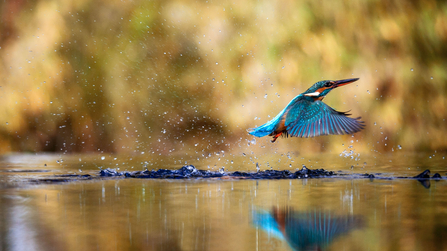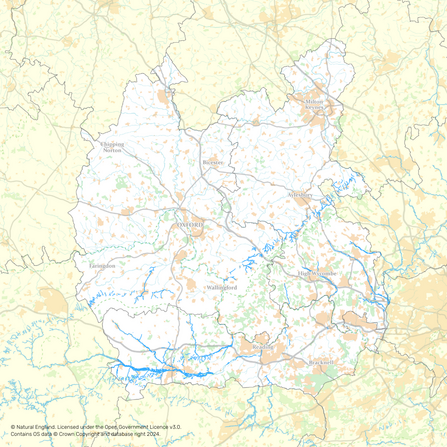Chalk streams are rivers that rise from chalk bedrock, characterised by clear waters and a rich variety of species. They thrive with life, providing habitats for species including the water vole, Atlantic salmon and brown trout. With 80% of these endangered rivers located in Southern England, these rare waterways are England’s equivalent to the Amazon rainforest and must urgently be granted the unique protection they deserve.
Save our chalk streams!
The Letcombe Brook running through BBOWT's Letcombe Valley nature reserve, one of our local chalk stream habitats. Picture: M Bailey
Save our Chalk Streams (https://www.youtube.com/watch?v=Nyi4ibdqFpg)
BBOWT president Steve Backshall explains the importance of chalk streams and how you can help to protect them.
The Government has recently made a series of announcements on water policy, including publishing the Water (Special Measures) Bill, introduced to Parliament on Wednesday 4 September. The Bill aims to boost enforcement powers for water regulators, implement tougher penalties and grant new powers to the Environment Agency. The Government also promised to carry out a full review to shape further legislation, with further detail in the autumn.
While we welcome these measures, we still need urgent, specific protections for our precious unique chalk streams, as recommended by the expert, independent CaBA Chalk Stream Restoration Strategy.
Only 11 out of 220 British chalk streams have any legal protections, and even these fall short of the measures needed to defend these rivers. While the Site of Special Scientific Interest (SSSI) status some have been granted is effective for stand-alone protected sites, it is not well suited to protecting chalk streams which are heavily influenced by activities across their catchments.

The Letcombe Brook running through BBOWT's Letcombe Valley nature reserve, one of our local chalk stream habitats. Picture: M Bailey
We are calling for the Government to introduce specific protections for all our chalk streams to protect them from development-related harm. These include direct harm (at the development site) and harm from wider pollution.
Direct harm can involve new development that interferes with the channel or floodplains associated with the chalk stream, including concreting over floodplains and diverting the natural river channel. To tackle direct harm, we are asking the Government to protect chalk streams within planning, ensuring that new developments do not alter their unique habitats. This includes the introduction of adequate buffer zones surrounding the chalk stream, as recommended by the CaBA Chalk Stream Restoration Strategy. A 50-100 metre ‘no development zone’, as recommended by Natural England, would protect these vulnerable streams from both pollution and habitat loss.
Sewage and domestic wastewater outflows, agricultural fertiliser runoff and pollution from highways can all add new chemicals into streams which interfere with natural processes that keep the water clean and healthy. Earlier this year, raw sewage burst from manholes and flowed into the River Lambourn for weeks and the River Misbourne suffered a category 1 pollution event. To prevent harm from wastewater pollution, we are calling for planning approval to be contingent on parallel investment in water supply and treatment infrastructure, to improve sewage treatment sites and put a stop to the release of harmful wastewater into our chalk streams.
Alongside these changes to planning policy, ambitious building regulations must be adopted to address additional pressures on chalk stream catchments, such as over-abstraction, as outlined by the CaBA Chalk Stream Restoration Strategy.

Chalk streams are home to wildlife such as kingfishers, salmon and water voles. Picture by Marijn Bouwhuis
How can you help?
We need your help to respond to the Government’s changes to planning in England to deliver stronger protections specifically designed for our chalk streams. Chalk streams must be clearly classified as an irreplaceable habitat, alongside ancient woodland, to grant protection from new development threatening to damage these precious habitats.
The consultation on the Government’s National Planning Policy Framework is now open until 11:45pm on 24th September. To add your voice and help protect our chalk streams, you can complete our Save Our Chalk Streams e-action to respond to the National Planning Policy Framework.
Our e-action allows you to personalise your response with why chalk streams are so special and provides a template with our policy asks. To read more about our technical response to specific clauses in the policy document, click here.

The estimated extent of chalk stream habitats across our counties, based on available data.
What we’re doing
In 2023, BBOWT launched the Save Our Chalk Streams campaign to protect these globally rare habitats. We raised awareness at the Wilder Conference, emphasising the urgency of restoring rivers before 2063, which is the government's target date for achieving good river health.
With only 11 out of 220 UK chalk streams legally protected, over 1,000 supporters wrote to their MPs, urging them to become Chalk Stream Champions and fight for stronger legal protections.
The Wildlife Trusts put on a parliamentary roundtable hosted by Maria Miller MP to bring attention to the crisis, and several other MPs advocated for more ambitious measures to safeguard chalk streams in the Government’s plans. This was the first phase of our ongoing efforts to protect these vital ecosystems.
To stand up for our chalk streams and hold the new Government to account on their promises to clean up Britain’s waterways, The Wildlife Trusts, alongside over 40 other originations, are supporting the March for Clean Water in London on 26 October. Find out more here.

